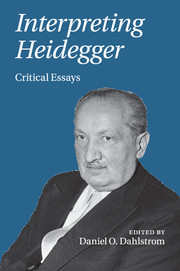Book contents
- Frontmatter
- Contents
- List of contributors
- Acknowledgments
- Method of citation and bibliography of Heidegger's works
- Introduction
- I Interpreting Heidegger's Philosophy
- II INTERPRETING HEIDEGGER'S INTERPRETATIONS
- 6 Being at the beginning: Heidegger's interpretation of Heraclitus
- 7 Being-affected: Heidegger, Aristotle, and the pathology of truth
- 8 Heidegger's interpretation of Kant
- 9 The death of God and the life of being: Heidegger's confrontation with Nietzsche
- 10 Heidegger's poetics of relationality
- III INTERPRETING HEIDEGGER'S CRITICS
- Index
10 - Heidegger's poetics of relationality
Published online by Cambridge University Press: 11 April 2011
- Frontmatter
- Contents
- List of contributors
- Acknowledgments
- Method of citation and bibliography of Heidegger's works
- Introduction
- I Interpreting Heidegger's Philosophy
- II INTERPRETING HEIDEGGER'S INTERPRETATIONS
- 6 Being at the beginning: Heidegger's interpretation of Heraclitus
- 7 Being-affected: Heidegger, Aristotle, and the pathology of truth
- 8 Heidegger's interpretation of Kant
- 9 The death of God and the life of being: Heidegger's confrontation with Nietzsche
- 10 Heidegger's poetics of relationality
- III INTERPRETING HEIDEGGER'S CRITICS
- Index
Summary
Heidegger's post-war concern with poetry addresses a diverse assemblage of poets and poetic styles, from the post-romantic lyricism of Rainer Maria Rilke, to the eerie expressionist poems of Georg Trakl, to the austere aestheticism of Stefan George, to name only the most prominent figures in Heidegger's readings. In all of these cases, Heidegger proceeds to think with the poets toward an understanding of being and language. His concern throughout is with relationality, the relation between the things of the world and the words of language. The world is not a collection of objects that would stand over against a subject. The word is not a means of expression for such subjects either. Instead, relationality requires that we think existence, whether that of the subject or the object, as opened onto a world beyond it and as inherently defined by this exposure, both affecting the world and being affected by it in turn. What Heidegger's later interpretations of the poets present us with, then – in the readings of Rilke (1946), Trakl (1950, 1952), and George (1957–1958) – is a steady development and deepening of this thought of relationality and thus of the connections between word and world. Heidegger's poetic work is ultimately no mere appendage to his more ontological concerns, but an unrelenting attempt to think the meaning of being apart from the confines of metaphysics. This transpires in a thinking of relationality.
Keywords
- Type
- Chapter
- Information
- Interpreting HeideggerCritical Essays, pp. 217 - 232Publisher: Cambridge University PressPrint publication year: 2011
- 1
- Cited by

